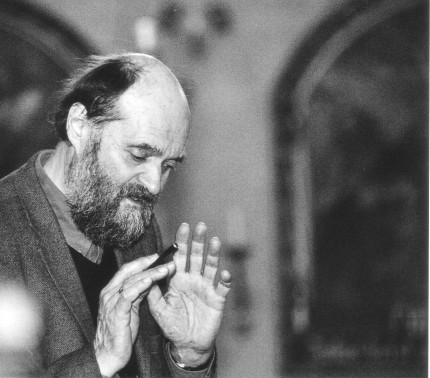Chicago Chorale marks Arvo Pärt’s 80th with wide-ranging tribute
Arvo Pärt turned 80 this September and the sixty-voice Chicago Chorale, under long-time artistic director Bruce Tammen, chose the inaugural program of their 15th anniversary season to celebrate the Estonian composer and his influence. The thoughtfully designed program featuring Pärt works alongside pieces by some of his most sympathetic contemporaries, performed in the beautiful space of St Vincent DePaul Parish Saturday night in Lincoln Park.
The church offered resonant but clear transmission of choral gems, which needed the maximum of clarity and space to convey the intense spiritual experience.
The first work on the program, Audi (1968) by the Norwegian Knut Nystedt actually predates the influence of Pärt’s work by some twenty years but proves that his style was in the air already with its slow-moving harmonics. The rich complexity of the polyphony required the assistance of ensemble singers to turn conductors briefly during some of the more difficult moments.
The Gloria (1995) by Swede Jan Sandstrom is vocally complex as well, with the Chorale’s excellent soloists floating over a choral stream which ebbs and flows to a long concluding fadeout. A short piece, Occulus non vidit, by Latvian composer Rihards Dubra is sweet and gentle. Dubra acknowledges his admiration for both Pärt and John Tavener.
The British composer is represented by a major work on the program: the Song for Athene (1993), whose resonant repeated tragic Alleluias and English text were so appropriate for the funeral of Princess Diana. The clarity of the Chorale’s diction was especially notable here.
Another major composer in the Pärt mode is of course Henryk Gorecki. His Amen (1975) is characteristic of his later style of somber and austere grandeur, which was conveyed powerfully and was a highlight of the evening.
Pärt’s compositions – five of his motets spanning his mature period– were positioned at the center of the program, concluding the first half and beginning the second. They constituted the heart of the concert: Zwei Slawische Psalmen (1997), by turns strong and restful; Summa (1977), a plain word-shaped setting of the Credo; Nunc dimittis (2001) starting in the ethereal and concluding in the glorious; Bogoroditse Djevo, familiar as an invigorating song of the season and Da pacem Domine with a placid opening, rapt attention to the words and a peaceful ending.
The concert concluded with Benedictio (1996) by the modernist Estonian Urmas Sisask, a radically different work with folkish elements and dynamic contrasts bringing a quiet benediction to close the evening.
Posted in Performances



Posted Nov 23, 2015 at 11:34 pm by Madelon
Knowing firsthand of the incredible skills of the Chorale, I only wish I could have been there. I hope that a recording will become available!